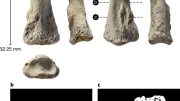New archaeological research from The Australian National University (ANU) has found that Homo erectus, an extinct species of primitive humans, went extinct in part because they were ‘lazy’.
An archaeological excavation of ancient human populations in the Arabian Peninsula during the Early Stone Age, found that Homo erectus used ‘least-effort strategies’ for tool making and collecting resources.
This ‘laziness’ paired with an inability to adapt to a changing climate likely played a role in the species going extinct, according to lead researcher Dr. Ceri Shipton of the ANU School of Culture, History, and Language.
“They really don’t seem to have been pushing themselves,” Dr. Shipton said.
“I don’t get the sense they were explorers looking over the horizon. They didn’t have that same sense of wonder that we have.”
Dr. Shipton said this was evident in the way the species made their stone tools and collected resources.
“To make their stone tools they would use whatever rocks they could find lying around their camp, which were mostly of comparatively low quality to what later stone tool makers used,” he said.
“At the site we looked at there was a big rocky outcrop of quality stone just a short distance away up a small hill.
“But rather than walk up the hill they would just use whatever bits had rolled down and were lying at the bottom.
“When we looked at the rocky outcrop there were no signs of any activity, no artifacts, and no quarrying of the stone.
“They knew it was there, but because they had enough adequate resources they seem to have thought, ‘why bother?’”.
This is in contrast to the stone tool makers of later periods, including early Homo sapiens and Neanderthals, who were climbing mountains to find good quality stone and transporting it over long distances.
Dr. Shipton said a failure to progress technologically, as their environment dried out into a desert, also contributed to the population’s demise.
“Not only were they lazy, but they were also very conservative,” Dr. Shipton said.
“The sediment samples showed the environment around them was changing, but they were doing the exact same things with their tools.
“There was no progression at all, and their tools are never very far from these now dry river beds. I think in the end the environment just got too dry for them.”
The excavation and survey work was undertaken in 2014 at the site of Saffaqah near Dawadmi in central Saudi Arabia.
The research has been published in a paper for the PLoS One scientific journal.
Reference: “Acheulean technology and landscape use at Dawadmi, central Arabia” by Ceri Shipton, James Blinkhorn, Paul S. Breeze, Patrick Cuthbertson, Nick Drake, Huw S. Groucutt, Richard P. Jennings, Ash Parton, Eleanor M. L. Scerri, Abdullah Alsharekh and Michael D. Petraglia, 27 July 2018, PLOS One.
DOI: 10.1371/journal.pone.0200497









If by laziness you mean too lazy to know the distinction between the heavy metal “lead” and the past tense of “to lead” as “led”, I heartily agree.
Love it.
Ha ha. That’s what I thought. But then, archaeologists are not English majors after all.
Sounds like they were ‘early Republiklans’…Hahahaha!!!
Hmmm. This sounds an awful lot like the accusation by the ruling class that poor people are poor because they are “lazy”, thereby attempting to justify their stupefying wealth (and refusal to pay taxes for social programs), by asserting that the rich “deserve” the wealth that they stole. Of course, you could turn it around and say that the present day wealthy parasites are securing their own doom, but not before they kill all the rest of us off, unfortunately.
Hmmm. This sounds an awful lot like the accusation by the ruling class that poor people are poor because they are “lazy”, thereby attempting to justify their stupefying wealth (and refusal to pay taxes for social programs), by asserting that the rich “deserve” the wealth that they stole. Of course, you could turn it around and say that the present day wealthy parasites are securing their own doom, but not before they kill all the rest of us off, unfortunately.
I would like to add that the assertion “they didn’t have the same sense of wonder that we have” is very un-scientific. How could you possibly know that? That smacks, again, of the old canard of the slaveocracy, for instance, that stated that black African people didn’t “feel pain the way that we do”, whilst whipping the skin off their backs.
So….they were the first millennials?
Not having as big brains as Homo sapiens doesn’t make them “lazy”. As others have pointed out, this articles deals in a lot of very unscientific terms.